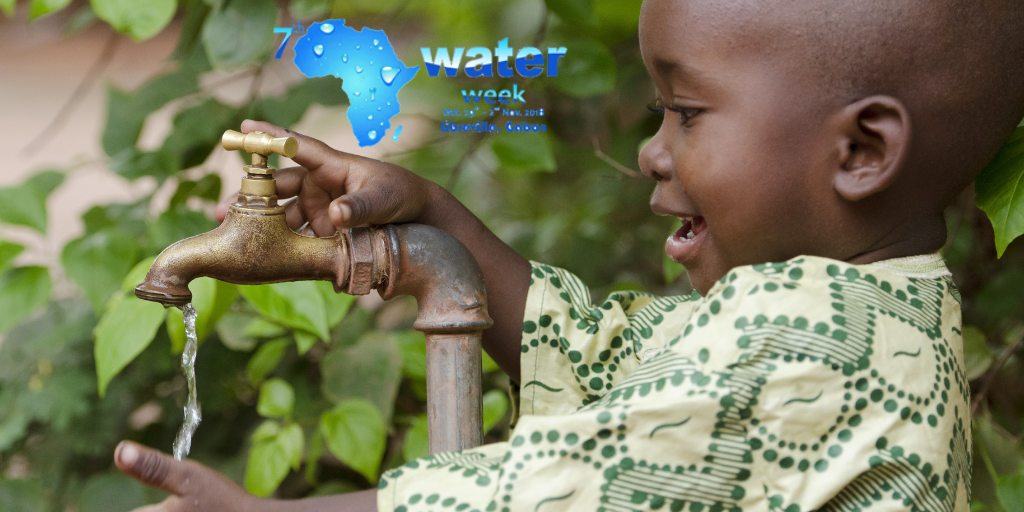Thankfully, Africa can also be on the frontlines of the solutions. These times call for bold action; and last week at the 7 th Africa Water Week (AWW-7), I was fortunate to engage with many innovative ideas and constructive debates commensurate with this need for boldness.

The theme of this year’s conference was Toward Achieving Water Security and Safely Managed Sanitation for Africa, convened by the African Ministers Council on Water (AMCOW), the African Union Commission, and other development partners. The conference was a busy buzz with over 1000 participants from governments, regional institutions, international partners, the private sector, the scientific community, civil society, and the media. There is an old African proverb “if you want to go quickly, go alone; if you want to go far, go together” and I felt that #AWW7 exemplifies this spirit of collaboration.
AWW-7 aimed to discuss and collectively seek solutions to Africa’s water resources and sanitation challenges. It is held biennially to build momentum on achieving the Sustainable Development Goals (SDGs) related to water security and sanitation by 2030, the 2025 Africa Water Vision, as well as to crystalize the way forward for actualizing Africa’s Agenda 2063, a strategic framework for the socio-economic transformation of the continent, adopted in 2013.
We at the World Bank believe that AWW-7 provides an opportunity for all to advance the aspirations of the people of Africa for healthier and wealthier lives, and together, ensure that the critical role of water is both recognized and addressed through our joint efforts. According to UN Water, water security enables populations to safeguard sustainable access to adequate quantities of acceptable quality water for sustaining livelihoods, human wellbeing, and socio-economic development – in addition to ensuring protection against water-borne pollution and water-related disasters, and for preserving ecosystems in a climate of peace and political stability.
I would like to highlight a number of themes that emerged from AWW-7.
First, it is clear that we need to improve water security and safely managed sanitation to progress towards achieving the SDGs in the continent. In line with this ambition, the World Bank last year published the report “Uncharted Waters.” This analyzed the linkages between drought, food insecurity, stunting, educational outcomes, and poverty for women in Africa. The most striking result was how the negative impacts of water crises are transmitted between generations, contributing to long-term poverty traps.
Second, the importance of identifying the technical, financing and governance challenges in achieving the SDGs. It was with these challenges in mind that the World Bank developed the Water, Sanitation and Hygiene Poverty Diagnostic (WASH PD) initiative, which countries can use to assess their relationship of access to water supply and sanitation to poverty and health indicators. So far, we have conducted WASH PD research in 18 countries worldwide, including the Democratic Republic of Congo, Ethiopia, Mozambique, Niger, Nigeria, Tanzania, and Tunisia. We anticipate supporting many more countries with further WASH PD research in the coming years.
And these diagnostics have led to real results, including increased financing to the WASH sector in many countries. For example, in Nigeria, based on the results of the WASH Poverty Diagnostic, the Government has requested financing of US$700 million from the World Bank for addressing water supply and sanitation service needs. And in Tanzania, innovative spatial mapping in the Wash PD demonstrated the linkages between poor water and sanitation and stunting, ensuring a strong share of funding to these needs under a new Early Years Initiative tied to the Human Capital Project.
Third, how water is managed will play a major role in determining the expected economic impact of global warming. I shared the findings from the World Bank’s “High and Dry” report, which looked at this issue. Its analysis showed that in Africa, continuing current policies was estimated to reduce GDP by 6% per year by 2050. However, taking policy actions now to improve water allocation amongst sectors and improve the efficiency of water use would help contribute to higher GDP growth rates in Africa.
Finally, everyone was enthused about the opportunities for technology to serve Africa’s needs. Africa really can become a hotbed for innovative solutions. A 2016 World Bank survey identified over 170 technology innovation centers across Africa, such as Kenya’s iHub; and a new generation of start-ups - such as eWaterPay and Waterpreneurs - which link water start-ups to potential investors. We are supporting the development of this innovation ecosystem through the IFC’s Water Innovation Platform for Africa, which links technology innovators to water utilities. Disruptive technologies are changing the world as we know it, the social process of innovation continues apace and Africa is well-placed to leapfrog to new ways of operating when it comes to technology and innovation.
We are at an historic moment when recognition of the role of water in achieving the world’s priorities in terms of human well-being and the Earth’s sustainability is as high as it has ever been. But it is up to all of us to seize the moment to the benefit of the people of Africa by refocusing our efforts on meeting the universal water supply and sanitation goals of the SDGs, and ensuring that the continent’s critical water basins and groundwater are managed collaboratively amongst countries to ensure climate resilience.
During the opening plenary, at which I served as a panelist alongside ministers and other institutional representatives, I emphasized that these ambitious agendas require us to look beyond traditional approaches, and to harness the power of private financing and technology innovation in the service of the continent’s water agenda. The World Bank stands ready to work with the nations of Africa and its partners to make this happen – and we look forward to hearing all about the progress made at the next Africa Water Week.


Join the Conversation